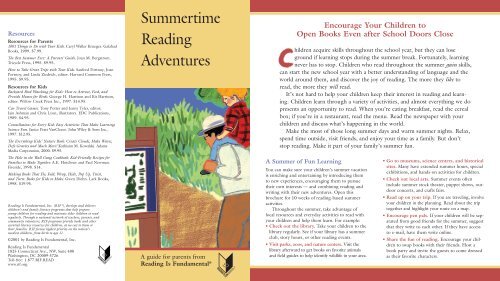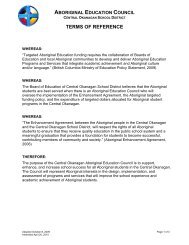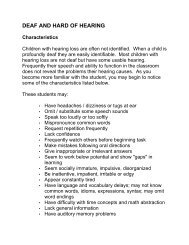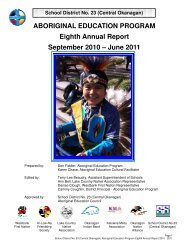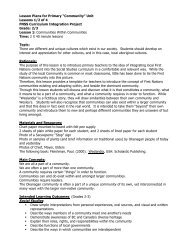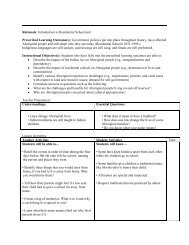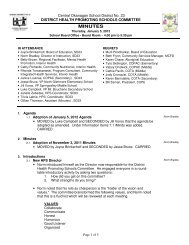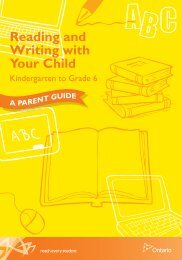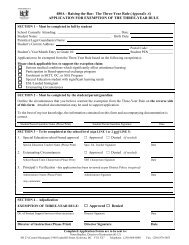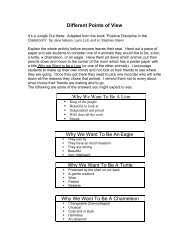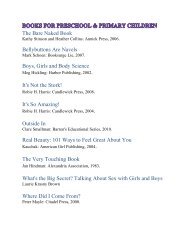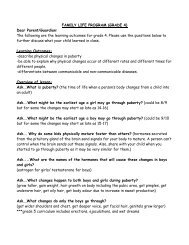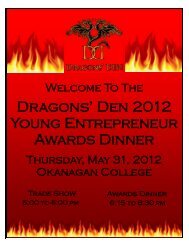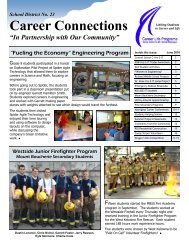RIF Brochure/Summer - Reading Is Fundamental
RIF Brochure/Summer - Reading Is Fundamental
RIF Brochure/Summer - Reading Is Fundamental
You also want an ePaper? Increase the reach of your titles
YUMPU automatically turns print PDFs into web optimized ePapers that Google loves.
Resources<br />
Resources for Parents<br />
1001 Things to Do with Your Kids. Caryl Waller Krueger. Galahad<br />
Books, 1999. $7.99.<br />
The Best <strong>Summer</strong> Ever: A Parents’ Guide. Joan M. Bergstrom.<br />
Tricycle Press, 1995. $9.95.<br />
How to Take Great Trips with Your Kids. Sanford Portnoy, Joan<br />
Portnoy, and Linda Ziedrich, editor. Harvard Common Press,<br />
1995. $9.95.<br />
Resources for Kids<br />
Backyard Bird Watching for Kids: How to Attract, Feed, and<br />
Provide Homes for Birds. George H. Harrison and Kit Harrison,<br />
editor. Willow Creek Press Inc., 1997. $14.95.<br />
Car Travel Games. Tony Potter and Jenny Tyler, editor;<br />
Iain Ashman and Chris Lyon, illustrators. EDC Publications,<br />
1989. $4.95.<br />
Constellations for Every Kid: Easy Activities That Make Learning<br />
Science Fun. Janice Pratt VanCleave. John Wiley & Sons Inc.,<br />
1997. $12.95.<br />
The Everything Kids’ Nature Book: Create Clouds, Make Waves,<br />
Defy Gravity and Much More! Kathiann M. Kowalski. Adams<br />
Media Corporation, 2000. $9.95.<br />
The Hole in the Wall Gang Cookbook: Kid-Friendly Recipes for<br />
Families to Make Together. A.E. Hotchner and Paul Newman.<br />
Fireside, 1998. $14.<br />
Making Books That Fly, Fold, Wrap, Hide, Pop Up, Twist,<br />
and Turn: Books for Kids to Make. Gwen Diehn. Lark Books,<br />
1998. $19.95.<br />
<strong>Reading</strong> <strong>Is</strong> <strong>Fundamental</strong>, Inc. (<strong>RIF</strong> ® ), develops and delivers<br />
children’s and family literacy programs that help prepare<br />
young children for reading and motivate older children to read<br />
regularly. Through a national network of teachers, parents, and<br />
community volunteers, <strong>RIF</strong> programs provide books and other<br />
essential literacy resources for children, at no cost to them or<br />
their families. <strong>RIF</strong> focuses highest priority on the nation’s<br />
neediest children, from birth to age 11.<br />
©2001 by <strong>Reading</strong> <strong>Is</strong> <strong>Fundamental</strong>, Inc.<br />
<strong>Reading</strong> <strong>Is</strong> <strong>Fundamental</strong><br />
1825 Connecticut Ave., NW, Suite 400<br />
Washington, DC 20009-5726<br />
Toll-free: 1.877.<strong>RIF</strong>.READ<br />
www.rif.org<br />
Editorial and design by KSA-Plus Communications, Inc.<br />
<strong>Summer</strong>time<br />
<strong>Reading</strong><br />
Adventures<br />
A guide for parents from<br />
<strong>Reading</strong> <strong>Is</strong> <strong>Fundamental</strong> ®<br />
Encourage Your Children to<br />
Open Books Even after School Doors Close<br />
hildren acquire skills throughout the school year, but they can lose<br />
ground if learning stops during the summer break. Fortunately, learning<br />
never has to stop. Children who read throughout the summer gain skills,<br />
can start the new school year with a better understanding of language and the<br />
world around them, and discover the joy of reading. The more they like to<br />
read, the more they will read.<br />
It’s not hard to help your children keep their interest in reading and learning.<br />
Children learn through a variety of activities, and almost everything we do<br />
presents an opportunity to read. When you’re eating breakfast, read the cereal<br />
box; if you’re in a restaurant, read the menu. Read the newspaper with your<br />
children and discuss what’s happening in the world.<br />
Make the most of those long summer days and warm summer nights. Relax,<br />
spend time outside, visit friends, and enjoy your time as a family. But don’t<br />
stop reading. Make it part of your family’s summer fun.<br />
A <strong>Summer</strong> of Fun Learning<br />
You can make sure your children’s summer vacation<br />
is enriching and entertaining by introducing them<br />
to new experiences, encouraging them to pursue<br />
their own interests — and combining reading and<br />
writing with their new adventures. Open this<br />
brochure for 10 weeks of reading-based summer<br />
activities.<br />
Throughout the summer, take advantage of<br />
local resources and everyday activities to read with<br />
your children and help them learn. For example:<br />
• Check out the library. Take your children to the<br />
library regularly. See if your library has a summer<br />
club, story hours, or other reading events.<br />
• Visit parks, zoos, and nature centers. Visit the<br />
library afterward to get books on favorite animals<br />
and field guides to help identify wildlife in your area.<br />
• Go to museums, science centers, and historical<br />
sites. Many have extended summer hours, special<br />
exhibitions, and hands-on activities for children.<br />
• Check out local arts. <strong>Summer</strong> events often<br />
include summer stock theater, puppet shows, outdoor<br />
concerts, and crafts fairs.<br />
• Read up on your trip. If you are traveling, involve<br />
your children in the planning. Read about the trip<br />
together and highlight your route on a map.<br />
• Encourage pen pals. If your children will be separated<br />
from good friends for the summer, suggest<br />
that they write to each other. If they have access<br />
to e-mail, have them write online.<br />
• Share the fun of reading. Encourage your children<br />
to swap books with their friends. Host a<br />
book party and invite the guests to come dressed<br />
as their favorite characters.
Week 1<br />
• Write a list of things<br />
you want to do this<br />
summer. Don’t forget<br />
to include reading!<br />
• Make a chart to keep<br />
track of all the books<br />
you read this summer.<br />
• Write down on your<br />
calendar the time the<br />
sun sets today.<br />
• Start a summer scrapbook.<br />
Include souvenirs<br />
of any trips you take,<br />
photos, ticket stubs, and<br />
Celebrate summer<br />
Keep in touch<br />
Week 2<br />
• Make a personal phone<br />
book. List phone numbers<br />
and addresses<br />
of your friends and<br />
relatives.<br />
• Design your own stationery<br />
and write a<br />
letter to a friend.<br />
• Start a journal with a<br />
friend or relative. Take<br />
turns writing in it all<br />
summer long. You can<br />
even do this by mail or<br />
e-mail.<br />
• Write a letter to your<br />
favorite author. A<br />
projects you work on<br />
during the summer.<br />
• List all the books by<br />
your favorite author.<br />
See how many you can<br />
read this summer.<br />
• Swap books with a<br />
friend. Keep sharing<br />
books throughout<br />
summer.<br />
• Take a walk. Write<br />
about or draw the<br />
things you see that<br />
show summer is here.<br />
librarian can help you<br />
find a postal or e-mail<br />
address.<br />
• Draw a picture postcard<br />
of an imaginary place.<br />
On the back, write a<br />
message. Mail it to a<br />
friend or relative or put<br />
it in your scrapbook.<br />
• The first U.S. postage<br />
stamps were designed in<br />
1847. Be a philatelist.<br />
Design your own stamp.<br />
• Word game! Invent a<br />
code (A=1, B=2, for<br />
example). Send a message<br />
in code to a friend.<br />
Discover recipes for fun<br />
Week 3<br />
• List all the ice cream<br />
flavors you can think of.<br />
Now put them in A-B-<br />
C order.<br />
• Invent a recipe for a<br />
cool summer drink.<br />
Write it on a recipe<br />
card. Serve the drink<br />
to your friends.<br />
• Go to the library and<br />
find a cookbook. Make<br />
the most interesting<br />
dish in the book.<br />
• Read the directions on<br />
a box of gelatin. Ask a<br />
parent if you can help<br />
make dessert tonight.<br />
• Work up an appetite by<br />
reading a story about<br />
food. Make and eat the<br />
food you read about.<br />
• Word game! How<br />
many smaller words can<br />
you find in the word<br />
watermelon?<br />
10 Weeks of Fun: <strong>RIF</strong>’s <strong>Summer</strong> <strong>Reading</strong> Calendar<br />
<strong>Reading</strong> every day, even if it’s for just a few minutes, improves children’s ability to read and learn all<br />
year long. Here are 10 weeks of activities that involve reading and related skills. There’s no special<br />
order, and you don’t have to do everything listed in a particular week. Just pick the ones that look<br />
interesting — or think of your own ideas for summertime reading fun.<br />
Travel the world<br />
Week 4<br />
• If you are going on a<br />
family vacation this<br />
summer, read about<br />
your trip. Mark your<br />
travel route on a map.<br />
• Pretend you are going<br />
to visit another city,<br />
state, or country with a<br />
friend or relative.<br />
1. Write to the tourist<br />
bureau for more<br />
information. If<br />
you plan to visit a<br />
foreign country, write<br />
to the embassy.<br />
2. Visit the library and<br />
find books about the<br />
place you want to<br />
visit. Or search online<br />
for information.<br />
Enjoy the great outdoors<br />
Week 5<br />
• Pick wildflowers and<br />
press them between the<br />
pages of a heavy book<br />
until the end of summer.<br />
• Plan a backyard camping<br />
trip with a friend.<br />
List all the things you<br />
will need to survive.<br />
• Plan a family “booknic”<br />
at your favorite outdoor<br />
spot, such as the beach,<br />
a park, or the woods.<br />
Pack lunch and plenty<br />
to read.<br />
3. Plan your itinerary —<br />
and don’t forget to<br />
check the weather!<br />
• Pick an important news<br />
event from another city,<br />
state, or country. Find<br />
as much information on<br />
the topic as possible —<br />
read newspapers, listen<br />
to the radio, and watch<br />
TV news. Talk about<br />
what you learned.<br />
• Word game! Look for<br />
out-of-state license<br />
plates. Make a list of all<br />
the state names and<br />
slogans. Decide which<br />
ones you like the best.<br />
Ask friends and relatives<br />
which are their favorites.<br />
• Collect shells at the<br />
beach or rocks along a<br />
trail. Use a nature guide<br />
to identify them.<br />
• Find something small<br />
enough to put in your<br />
pocket. Write or tell a<br />
story about it.<br />
• Look for shapes and<br />
designs in the clouds.<br />
Draw them.<br />
• Word game! Make a list<br />
of words to describe<br />
fireworks.<br />
Visit fun places<br />
Week 6<br />
• An animal has escaped<br />
from the zoo! Make up<br />
a story about it. Tell it<br />
to a friend or family<br />
member — or write it<br />
down. Add pictures, if<br />
you’d like.<br />
• What museums are<br />
close to your house?<br />
Are there any old, historic<br />
buildings in the<br />
area? Find these places<br />
on a map. Find out<br />
what is on exhibit at<br />
the museums and why<br />
the old buildings are<br />
important.<br />
• Go back in time and<br />
pretend you lived in<br />
— or did business in —<br />
the oldest building in<br />
your area. Write a story<br />
about how you spent<br />
your time.<br />
Week 7<br />
Become a publisher<br />
•Make your own joke<br />
book. Collect jokes and<br />
riddles from your family<br />
and friends.<br />
•Cut out pictures from<br />
an old magazine or<br />
catalog. Write a story<br />
about them.<br />
• Create a rebus story (a<br />
story that uses pictures to<br />
represent words). Write a<br />
short story, and then<br />
• Make a list of zoo animals.<br />
Sort them by<br />
different categories,<br />
such as type of animal<br />
(mammals, fish, etc.) or<br />
coloring (green, brown,<br />
striped, etc.).<br />
• Visit the zoo with<br />
friends or relatives and<br />
find the animals on<br />
your list.<br />
• Visit a museum or historical<br />
building with<br />
friends or relatives.<br />
Write a list of things<br />
you see that you didn’t<br />
expect.<br />
• Word game! Think of<br />
the softest animal or the<br />
oldest thing you’ve ever<br />
touched. Write a poem<br />
about it, but don’t use<br />
the word soft or old.<br />
substitute pictures (that<br />
you draw or cut out) for<br />
some of the words.<br />
•Start a round-robin<br />
story. Write the beginning,<br />
then ask friends to<br />
add to it until it has an<br />
ending.<br />
• Visit www.kidauthors.com<br />
or www.kidnews.com<br />
and find out how you<br />
can publish your stories<br />
and poems online.<br />
Watch the skies<br />
Week 8<br />
• Learn what birds live in<br />
your area. (Birds are<br />
described in books<br />
called Field Guides.)<br />
Wake up early to go<br />
bird watching and list<br />
the birds you see.<br />
• Which constellations<br />
can you see on a clear<br />
summer night? Look<br />
at the sky using a star<br />
guide to help you find<br />
the constellations.<br />
• People have been looking<br />
at the skies for<br />
Design something big<br />
Week 9<br />
• Invent a tool to help<br />
you do chores more<br />
easily. Draw a picture of<br />
it or make it from some<br />
old junk.<br />
• Read aloud the names<br />
of some of the cars in<br />
the classified section of<br />
your newspaper. Design<br />
a new car and name it.<br />
• Walk around your<br />
neighborhood and look<br />
at the houses. Design a<br />
Week 10<br />
• Remember the wildflowers<br />
you pressed<br />
between the pages of<br />
a heavy book? Remove<br />
them, and put them in<br />
your summer scrapbook<br />
or paste them on heavy<br />
paper to make a<br />
bookmark.<br />
• Review the chart you<br />
made to track the books<br />
you read this summer.<br />
Pick new books to read.<br />
• Notice what time the<br />
sun sets today. Compare<br />
generations. Ask a<br />
grandparent or a much<br />
older friend to tell you<br />
a story about his or her<br />
childhood.<br />
• The first UFO was<br />
reported in 1947. Read<br />
a science fiction book in<br />
honor of it.<br />
• Word game! Baseballs<br />
also fly through the sky<br />
in summer. Find a list of<br />
baseball teams in the<br />
sports section of the<br />
newspaper. Put them in<br />
A-B-C order.<br />
house that would best<br />
suit your lifestyle.<br />
• Design your own board<br />
game and write the rules.<br />
• Everything we use was<br />
designed by someone.<br />
Start a collection of<br />
things you like, or add<br />
to a collection you<br />
already have. Use a<br />
guide to learn the value<br />
of your collection.<br />
Honor summer’s end<br />
it to the time the sun<br />
set during week one.<br />
• Make a list of the supplies<br />
you need for<br />
school. Start shopping.<br />
• Plan an end-of-summer<br />
celebration. Write a list<br />
of the 10 best things<br />
you did this summer.<br />
Design a menu of your<br />
favorite summer treats.<br />
• Word game! <strong>Summer</strong><br />
days are the longest days<br />
of the year. List the<br />
longest words you know.


